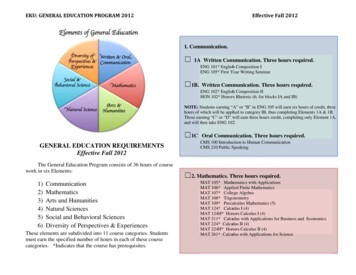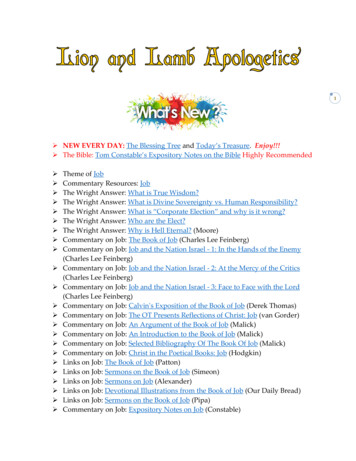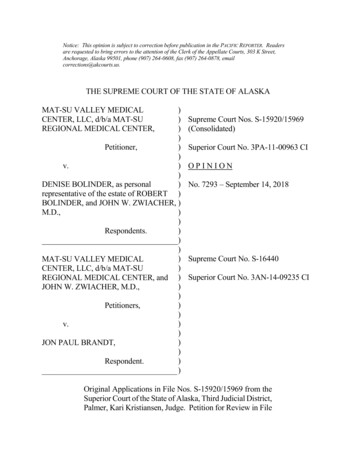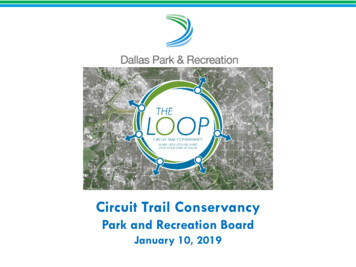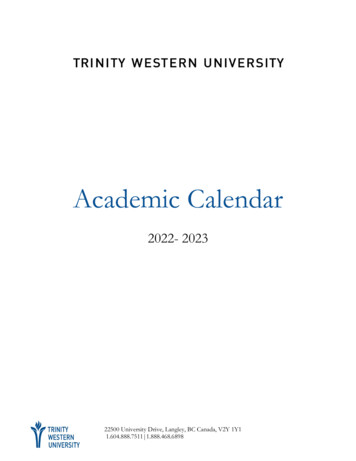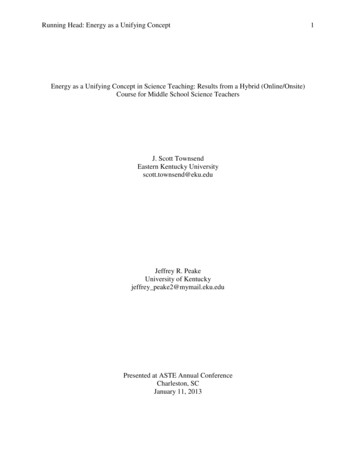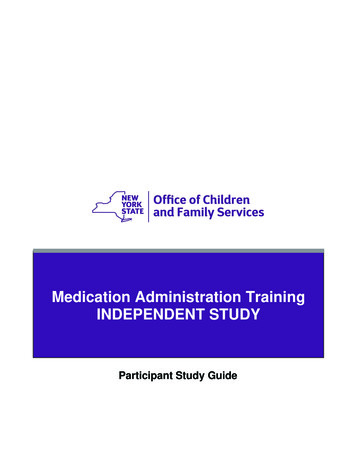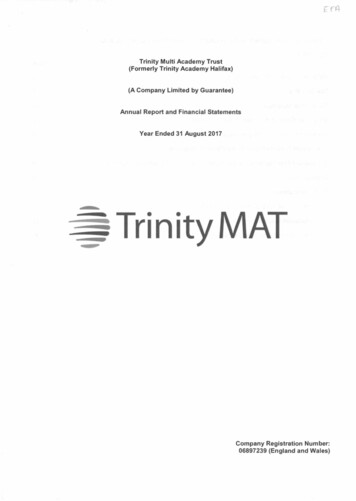
Transcription
Trinity Multi Academy Trust(Formerly Trinity Academy Halifax)(A Company Limited by Guarantee)Annual Report and Financial StatementsYear Ended 31 August 2017Trinity MATCompany Registration Number:06897239 (England and Wales)
TRINITYMULTI ACADEMY TRUST (FORMERLYTRINITY ACADEMYHALIFAX)CONTENTSPageReference and administrative details2Directors' Report3Governance Statement11Statement of Regularity, Propriety and Compliance15Statement of Directors' Responsibilities16Independent Auditor's Report on the Financial Statements17Statement of Financial Activities incorporating Income and Expenditure Account19Balance sheet20Cash flow statement21Notes to the Financial Statements, incorporating:Statement of Accounting Policies22Other Notes to the Financial Statements28
TRINITY MULTI ACADEMY TRUST (FORMERLY TRINITY ACADEMY HALIFAX)REFERENCE AND ADMINISTRATIVE DETAILSMembersThe Very Reverend Jonathan GreenerThe Reverend Canon Ian Wildey (representing WDUT)The Venerable Peter TownleyJohn McLeodTom MiskellRoy FisherDirectorsTom Miskell, ChairWayne Keating (#)Professor David BakerLouise Bryan (appointed 13 March 2017)Gareth Davies (appointed 1 September 2016)Prof. Claire Honess (appointed 1 September 2016)Wayne Kenny (appointed 28 November 2016) (#)Rev. June Lawson (appointed 1 September 2016)Michael Gosling, CEO(# member of Audit Committee)Company SecretarySenior Management Team: Chief Executive Officer / Accounting Officer Chief Financial Officer HR Director Head of School Effectiveness Executive Principal Principals (including Acting)Schofield Sweeney LLP, Church Bank House,Bradford, BD1 4DY.Mr Michael GoslingMr David SheardMrs Joanne HeyworthMr Tony StaneffMr James Franklin-SmithMr Charlie Johnson, Mr Nick Robinson,Mrs Nicki Clarke, Mrs Lianne LomasCompany NameTrinity Multi Academy Trust (Formerly Trinity AcademyHalifaxPrincipal and Registered OfficeShay LaneHalifaxWest YorkshireHX29TZCompany Registration Number06897239 (England and Wales)Independent AuditorRSM UK Audit LLP5th Floor Central Square29 Wellington StreetLeedsWest YorkshireLS14DLBankersLloydsCommercial StreetHalifaxHX1 1BBSolicitorsSchofield Sweeney LLPChurch Bank HouseBradfordBD14DY2
TRINITY MULTI ACADEMY TRUST (FORMERLY TRINITY ACADEMY HALIFAX)DIRECTORS' REPORT FOR YEAR ENDED 31 AUGUST 2017The Directors present their annual report together with the financial statements and the auditor's report ofthe charitable company for the year 1 September 2016 to 31 August 2017. The annual report serves thepurposes of both a Trustees' report, and a Directors' report under company law.The trust operates a primary academy, a secondary academy and a post-16 college in north Halifax,Calderdale. Its academies have a combined pupil capacity of 2,616 and as at October 2016 census thetrust had a total student roll of 2,202.STRUCTURE, GOVERNANCE AND MANAGEMENTConstitutionThe academy trust is a company limited by guarantee not having share capital (registration no. 06897239)and is an exempt charity. The charitable company's memorandum and articles of association are theprimary governing documents of the academy trust which are dated 23 March 2015. The Directors of thetrust are also the Directors of the charitable company for the purposes of company law. The charitablecompany changed name within the period to Trinity Multi Academy Trust (the "academy trust"), it waspreviously known as Trinity Academy Halifax.The academy trust fulfils an over-arching, and strategic role, ensuring that their vision for the character andethos of the academies, and its role in the local education system, is carried forward. The Members haveless practical involvement in the management of the company, as most day-to-day management decisionsare made collectively through the Directors and the Executive Principal, both appointed by the Members.Details of the Members and Directors who served throughout the year are included in the Reference andAdministrative information details on page 2.Members' LiabilityEach Member of the charitable company undertakes to contribute to the assets of the charitable companyin the event of it being wound up while they are a member, or within one year after he/she ceases to be amember, such amount as may be required, not exceeding 10, for the debts and liabilities contractedbefore they ceased to be a member.Trustee/Directors' IndemnitiesMembers' and Directors' indemnity provisions are detailed in Note 12 to the financial statements.Method of Recruitment and Appointment or Election of DirectorsThe Members can appoint up to eight Directors, Members may also appoint Staff Directors, ParentDirectors and Co-opted Directors. The Chief Executive Officer (CEO) is an Ex Officio Director as long as heremains in office. The Directors may appoint up to two Co-opted Directors for such term (not exceeding fouryears) but may not Co-opt an employee of the company as a Co-opted Director if thereby the number ofDirectors who are employees of the company would exceed one third of the total number of Directors(including the CEO). The Directors can appoint Staff Directors providing the amount of Staff Directors doesnot exceed one third of the total number of Directors (including the CEO).Where the Directors have not appointed Local Governing Bodies there shall be a minimum of two ParentDirectors however if there is an active Local Governing Body that should in turn appoint two ParentGovernors. Parent Directors and Parent members of the Local Governing Bodies or Advisory Bodies shallbe elected or appointed by the parents of registered students within the academies of the trust.The Articles of Association give full details relating to the appointment and removal of Directors.3
TRINITY MULTI ACADEMY TRUST (FORMERLY TRINITY ACADEMY HALIFAX)DIRECTORS' REPORT FOR YEAR ENDED 31 AUGUST 2017 (continued)Policies and Procedures Adopted for the Induction and Training of DirectorsInduction for new Directors appointed during the year was facilitated through the Chair and Clerk to theBoard of Directors together with the CEO and the Chief Financial Officer. New Directors and localGovernors are offered the opportunity to be paired with an existing Director or Governor as a mentor. Theacademy also buys in to the Local Authority's programme of Governor induction and training, which offers arange of Governor training courses throughout the year.Organisational StructureThe Members are the key decision makers and have over-arching power to ensure the ethos andeducational vision is embedded into all institutions within the trust. They in turn appoint a Board of Directorswho are in place to hold the CEO and all Local Governing Bodies (LGB's) to account for the performance oftheir school. The names of the Directors who were in office for Trinity Multi Academy Trust during the yearended 31 August 2017 are given on page 2.A central Audit Committee is formed to cover all elements of risk affecting any school or institution withinthe trust and reports directly to the Board of Directors.The individuals who make up the Local Governing Bodies (LGBs) are appointed by the Directors and areresponsible for the day to day management of each academy in the trust. At the end of the period the trustheld Trinity Academy Halifax, The Maltings College and Akroydon Primary Academy as the threeinstitutions within its trust.The LGB of each institution can establish sub-groups to carry out its work effectively and as required.Usually these form the basis of: Resources (covering finance, staffing and premises); Curriculum andAchievement (C&A) and Children, Families and Community (CFC) but can vary depending on the need orspecific ethos of the school.The organisational structure of the academy trust can be considered in four levels although there is anoverlap of levels one and two. The purpose of this structure is to devolve responsibility and encouragedecision making at the most appropriate level and empower the relevant staff accordingly. The Members have an over-arching and strategic role, ensuring that their vision for the characterand ethos of any academy in the trust, and its role in the local education system, is carried forward.They are also responsible for setting the key policies; agreeing and monitoring key objectives;overseeing the trust's budget and accounts; and being involved in Director appointments. The Directors are more closely involved in monitoring the educational and financial performance ofeach academy and linking this to setting and monitoring the performance of the Principal and SeniorManagers within each academy in the trust. These responsibilities include adopting an annual planand budget, monitoring each academy by the use of budgets, and making major decisions about thedirection of any academy, capital expenditure and senior staff appointments. The Directors delegatethe appointment of senior staff in each academy down to the Local Governing Body. The CEO, as Accounting Officer, is responsible for financial decisions on a day to day basis outsidethe Chief Financial Officers control, and is responsible for the regularity, propriety and value formoney throughout the trust. The CEO is responsible for a team of central multi academy trust staffincluding a Head of School Effectiveness (HoSE), a HR Director (HRD) and a Chief Financial Officer(CFO) and is also in post to ensure the Principals in each academy/school in the trust aresupported, challenged and held to account for their decisions. The Senior Leadership Group (SLG) at academy level depends on the academy requirements, sizeof the institution and the needs of the students and is planned accordingly based on these factors.The SLG of each academy is established with Principals of institutions, the CEO, the CFO and theHRD. The trust plans to increase capacity in key leadership areas as it plans to grow its MultiAcademy Trust in the future to improve and benefit all institutions within the trust.4
TRINITY MULTI ACADEMY TRUST (FORMERLY TRINITY ACADEMY HALIFAX)DIRECTORS' REPORT FOR YEAR ENDED 31 AUGUST 2017 (continued)Organisational Structure (continued)These Senior Leaders then control the academy at an executive level implementing the policies laid downby the Local Governing Body and reporting back to them. As a group the SLG is responsible for theauthorisation of spending within agreed budgets and the appointment of staff, though appointment boardsfor posts in the SLG should contain a Governor. Some spending control is devolved to members of theManagement Team, with limits above which an SLG Member must countersign. The Management Teamincludes the Senior Leadership Group, Subject Leaders and Pastoral Managers. These managers areresponsible for the day to day operation of the academy, in particular organising the teaching staff, facilitiesand students.Arrangements for setting pay and remunerationof key management personnelThe arrangements and range of remuneration packages for key management personnel are set by theDirectors and managed operationally by the CEO via Performance Management review throughout theyear and in full annually. The benchmarks and parameters for setting remuneration packages for key rolesin each institution are based on local schools relative to the size of institution and accountability of the role.These roles are managed by the CEO and are held to account accordingly. The CEO is held to accountthrough Performance Management review directly with the Board of Directors.Related Parties and other Connected Charities and OrganisationsThe CEO, a National Leader of Education (NLE), and other members of staff have enhanced the supportoffered to local schools and academies that may be interested in joining the multi academy trust in futureperiods. The Maltings College officially joined the trust in October 2016 and has continued its rapidprogress and improvement. Akroydon Primary Academy joined the trust in February 2017 and will start toreap the benefits of strategic leadership and financial planning in the next financial period.Trinity Multi Academy Trust has acquired a 100% share in a trading subsidiary, Fountain Springs DayNursery Ltd. in the year. This was previously owned by The Maltings College.OBJECTIVES AND ACTIVITESObjects and AimsThe main objects and aims of Trinity Multi Academy Trust are to serve the students in its care. It has asmall number of core principles: We expect all our schools to actively support each other and to share best practice for the benefit ofallWe encourage each of our schools to celebrate its distinctive identity within our trust communityWe are committed to providing quality-assured services to keep our schools legal, financially robustand continually improving.The Members and Directors strongly believe that these core values will be maintained and promoted in anyother academy that comes into the trust in the future (whether the school is a religiously designated faithschool or not).Objectives, Strategies and ActivitiesThe principle objectives of Trinity Multi Academy Trust for the year ended 31 August 2017 were: To ensure that every student enjoys a high-quality education supported through tuition,resources and care through a broad and balanced curriculum To maintain the 'moral imperative' we have fostered in the early part of Trinity's existence5learning
TRINITY MULTI ACADEMY TRUST (FORMERLY TRINITY ACADEMY HALIFAX)DIRECTORS' REPORT FOR YEAR ENDED 31 AUGUST 2017 (continued)Objectives, Strategies and Activities (continued) To partner with good/outstanding schools to add capacity to school improvement services (with aparticular focus on the primary phase) To provide value for money, and For central services to be developed in a timely manner to ensure the Multi Academy Trust remainssustainable and effective.Public BenefitMembers and Directors have referred to the public benefit guidance contained in part 1, section 4 of theCharities Act 2006 and the SORP (item GL 49), to have due regard to the Charity Commission's publishedgeneral and relevant guidance when they have reviewed the trust's aims and objectives. This has beenused in planning future activities to ensure the primary objective of any academy in the trust is achievedrather than providing a financial return to all its providers or members.STRATEGIC REPORTAchievementsand PerformanceDuring 2016/17 Trinity Academy Halifax showed census student numbers for year groups 7-11 in October2016 of 1,442 and post 16 student numbers at 306. The aims of the LGB were to achieve outstandingresults in all year groups and maintain or improve results compared to the previous year's results to cementthe outstanding Ofsted judgement. The results were very good during a time of changing educationallandscape in gradation and are identified in the Key Performance Indicators below.The Maltings College joined on the 1 October 2016 and had a census position in October 2016 of 148student numbers. The aims of the LGB were to continue the improvements throughout the college to furtherimprove the Ofsted rating and ensure an enhanced marketing push continued to further increase studentnumbers in coming years. The results stabilised overall but had very positive results in vocational sectorareas.Akroydon Primary Academy (APA) joined on the 1 February 2017 and had an in year census report of 341students across reception to year 6. The aims of the LGB were to implement multi academy trust policies,processes and procedures to enable stability of the school and facilitate a massive improvement drive toensure this school improves in the new academic year. The drive for rapid improvement at APA has startedfollowing its move into the trust and will be stepped up in the new academic year.The overall aims of the trust were to ensure results in all year groups were maintained or improvedcompared to the previous year's results and that our academies can ensure they continually improve andfurther benefit the life chances of the young people in our care.Key PerformanceIndicatorsIn 2016-17, Trinity Academy Halifax's Progress 8 provisional result is a 0.65 (from a validated 0.31 lastyear) - this means that students make roughly two thirds of a grade more progress in their suite of 8subjects at TAH, than other students of the same ability nationally and puts the results in the top 7% ofschools nationally. The basics measure which looks at the proportion of students achieving a grade 5 orhigher in English and mathematics showed an impressive result of 45% compared to a national average of39.1 %. This is generally regarded as a new measure following the gradation change where a grade 5reflects a high 'C' or low 'B.'Trinity Academy Halifax post-16 results were again very strong producing an average point score peracademic entry of 30.62 and an average point score per applied general entry of 48.91. These measureshave been reformed recently so comparisons year on year are generally incomparable.6
TRINITY MULTI ACADEMY TRUST (FORMERLY TRINITY ACADEMY HALIFAX)DIRECTORS' REPORT FOR YEAR ENDED 31 AUGUST 2017 (continued)Key Periormance Indicators (continued)The Maltings College, which joined the trust in October 2016, results have stabilised and have producedsome impressive results in most vocational sectors with an average result of a Distinction minus in appliedgeneral qualifications and an average of a Distinction in technical level qualifications. The college has alsoproduced a value added score for applied general qualifications of 0.07 showing students are makingslightly more progress than students nationally of the same ability (based on 2016 national averages).Akroydon Primary Academy was the other academy to join the multi academy trust in the financial periodon 1 February 2017, the trust has managed to improve the percentage of students reaching the expectedstandard in maths by 20% to 56% (from 36% last year) however the overall results are disappointing with25% of students reaching the expected standard across reading, writing and maths (compared to 28% lastyear). The trust has started a process of increased leadership support to ensure the academy makes rapidimprovement in the next academic year.Going ConcernAfter making appropriate enquiries the Directors have a reasonable expectation that the academy trust hasadequate resources to continue in operational existence for the foreseeable future. For this reason theycontinue to adopt the going concern basis in preparing these financial statements. Further details regardingthe adoption of the going concern basis can be found in the Statement of Accounting Policies.FINANCIAL REVIEWFinancial Review for the YearThe accounts for the year ended 31 August 2017 include one notable transaction. The West YorkshirePension Fund's deficit associated with the non-teaching staff decreased from 2,882k to 2,409k at 31August 2017. It is the opinion of the Members and Directors that the pension liability will not fall due forrepayment in the foreseeable future.Each academy's income is derived in the main from the Education & Skills Funding Agency (ESFA) and theLocal Authority (LA) in the form of recurrent and capital grants, the use of which is restricted to particularpurposes. The grants received from the ESFA and the LA during the year ended 31 August 2017 and theassociated expenditure are shown as restricted funds in the Statement of Financial Activities.Net movement in funds for the trust were 4,822k (2016: (3,567)k) with net assets of 34,229k (2016: 29,407k)The trust is not restricted with its use of allocated General Annual Grant (GAG) but ensured compliancewhere necessary to the current funding agreement. The forecast for future funding arrangements continuesto be increasingly volatile and has reaffirmed the importance of Financial Management for future yearswithin the trust. We have received our funding indications from the ESFA for 2017/18 and have managedthe curriculum and staffing model to best use the funds we have been allocated to achieve our educationalvision.Reserves PolicyThe Directors' review the level of reserves annually alongside the approved Reserves Policy. This reviewencompasses the nature of income and expenditure streams, the need to match income with commitmentsand the nature of reserves. The Directors' will ensure that the reserves policy continues to conform to therequirements laid down in the Academies' Financial Handbook 2016 produced by the ESFA and willmonitor any changes with the funding agreement and GAG restrictions as appropriate.It is the Directors' policy to maintain a level of unrestricted reserves which can be used for future educationpurposes in line with each academy improvement plan. At the year end the trust held unrestricted reservesof 1.3m and restricted reserves of 33.0m ( 35.4m of these restricted reserves related to restricted fixedasset funds). The restricted general fund excluding pension liability is nil but overall shows a negativefigure due to the pension liability value measured by the actuary. The reserves are held to ensure each7
TRINITY MULTI ACADEMY TRUST (FORMERLY TRINITY ACADEMY HALIFAX)DIRECTORS' REPORT FOR YEAR ENDED 31 AUGUST 2017 (continued)Reserves Policy (continued)academy has sufficient resources to improve the educational offer at any academy within the trust as itgrows. The target reserves for the trust is for one month's payroll bill which currently is estimated at 600kand with restricted and unrestricted reserves totalling 1.3 million at year end we have a focus this year toensure the reserves are maintained to ensure this isn't a risk going forward.The Directors' aim to maintain reserves to be able to provide assistance for any future capital projects asthey arise if they are not funded by the CIF (Condition Improvement Fund). The trust pension liability at theyear-end is 2,409k and this amount is underwritten by the Government if settlement was ever required.The pension liability does not have an immediate cash flow impact. The impact will be increased futurecontributions as a result of the scheme deficit.InvestmentPolicyThe trust has continued to adhere to its Investment Policy during the year. All academies in the trust bankwith Lloyds Bank and our policy involves surplus balances being placed on short or fixed term depositsthrough Lloyds Bank (or other available multi-national interest bearing accounts) to avoid the risk of anyloss of capital value of the surplus funds. Available funds are generally placed on short term deposit inorder to gain a risk averse interest payment upon maturity. All available funds are placed taking intoaccount any impact on social, environmental and ethical considerations to protect the reputation of thetrust. This policy ensures an assessment for impairment will be made at each reporting date.PRINCIPAL RISKS AND UNCERTAINTIESRisk ManagementThe Directors have assessed the major risks to which the trust is exposed, in particular those relating toeducational achievement, provision of facilities, finance and other operational areas of all academies. TheDirectors assign the LGB to implement systems which assess risks that face any academy in the trust,especially in the operational areas (e.g. teaching, health and safety, bullying and school trips) and inrelation to the control of finance which have continued throughout this financial year. The trust is committedto ensure there is a risk averse appetite through all academies within the trust and they maintain the benefitof the Audit Committee who ensure the Risk Management Policy is adhered to.The Directors have operational procedures including the DBS vetting of all new staff and visitors,supervision of school grounds, and internal financial controls in order to minimise risk. Although much workhas been done to reduce both the number and likely occurrence of risks, in order to protect the charitablecompany from any residual risks, Directors have ensured they have adequate insurance cover.Financial and Risk Management Objectives and PoliciesThe multi academy trust has an effective system of internal control and this is explained in more detail inthe following statement.The Members and Directors continue to review current examples of best practice and have: Set policies on internal controls which cover the following:the type of risks the trust facesthe level of risks which they regard as acceptablethe likelihood of the risks materialisingthe trust's ability to reduce the incidence and impact on operations of risks that do materialisethe costs of operating particular controls relative to the benefits obtained; Clarified the responsibility of the Senior Leadership Group and the Management Team in eachacademy to implement policies, to identify and evaluate risks for the Directors' consideration; Explained to employees that they have responsibility for internal control as part of theiraccountability for achieving objectives; Embedded the control system in all academies operations so that it becomes part of the culture ofeach academy;8
TRINITY MULTI ACADEMY TRUST (FORMERLY TRINITY ACADEMY HALIFAX)DIRECTORS' REPORT FOR YEAR ENDED 31 AUGUST 2017 (continued)Financial and Risk Management Objectives and Policies (continued) Developed systems to respond quickly to evolving risks arising from factors within each academyand to changes in the external environment; and Included procedures for reporting failings immediately to appropriate levels of management and theDirectors, together with details of corrective action being undertaken.The main financial risk to the trust comes from changes to the school and academy funding regimes beingintroduced and maintained in future years. These changes, which affect virtually every school and academyin England, are being moderated by a minimum funding guarantee per student of the previous year'sfunding whilst allocation protection funding reduced year on year towards zero. There is a much higherneed to ensure that student numbers rise to capacity where possible so student funding is achieved. Thiswill be continually monitored as changes to the funding regimes continue in the future.Plans for Future PeriodsThe trust continues to move into an exciting period of growth in the near future. We plan to support andimprove any local school, college or academy to give the students that attend these institutions the samelife chances as students from less deprived areas of the country. In this reporting period the company haschanged name to Trinity Multi Academy Trust (previously known as Trinity Academy Halifax) and isexpecting to grow and support up to six other institutions in the coming financial period. Cathedral Academyin Wakefield is one of the institutions that will convert into Trinity's Multi Academy Trust in the newaccounting period and we will continue to drive up standards and support the improvements within theacademy. We have also been appointed as the sponsor to Trinity Academy Sowerby Bridge (previouslycalled Sowerby Bridge High School) and this school will join the trust in the new financial period also.The trust will ensure it maintains the vision to drive up standards across all institutions in the trust and weare committed to ensuring the improved performance and stability of academies within the trust. There isalso a clear focus to ensure that our growth plans do not disadvantage any academy we are working with.The trust plans to continue its clearly identified progression planning for its employees by clearly settingopportunity routes for all middle and senior management. The trust plans to ensure the current and futureeducational offer is constantly reviewed to achieve excellence in all it does and will work alongside thefinancial objectives to achieve efficiencies as the trust grows.Equal OpportunitiesTrinity Multi Academy Trust is an equal opportunities employer and is mindful of its obligations under theEqualities Act 2010. The Directors recognise that equal opportunities are an integral part of good practicewithin the workplace.Disabled PersonsThe trust works alongside external agencies as necessary to enable support for disabled persons. Thepolicy of the trust is to support recruitment and retention of students and employees with disabilities. Eachacademy will provide resources for work place assessments and make any reasonable adjustments whereit is able to facilitate this.AuditorRSM UK Audit LLP has indicated its willingness to continue in office.9
TRINITY MULTI ACADEMY TRUST (FORMERLY TRINITY ACADEMY HALIFAX)DIRECTORS' REPORT FOR YEAR ENDED 31 AUGUST 2017 (continued)Statement as to disclosure of information to auditorThe Directors have confirmed that, as far as they are aware, there is no relevant audit information of whichthe auditor is unaware. Each of the Directors have confirmed that they have taken all the steps that theyought to have taken as Directorsffrustees in order to make themselves aware of any relevant auditinformation and to establish that it has been communicated to the auditor.Directors' report, incorporating a rtrregiC report, was approved by order of the Board of Directors, as thecompany Directors on'LJ II 'Z.PtJand signed on their behalf by:\Tom MiskellChair10
TRINITY MULTI ACADEMY TRUST (FORMERLY TRINITY ACADEMY HALIFAX)GOVERNANCE STATEMENTScope of ResponsibilityAs Directors we acknowledge we have overall responsibility for ensuring that the academy trust has aneffective and appropriate system of control, financial and otherwise. However, such a system is designedto manage rather than eliminate the risk of failing to achieve business objectives and can only providereasonable, not absolute, assurance against material misstatement or loss.The Board of Directors have delegated day to day responsibility to the CEO, as Accounting Officer, forensuring financial controls conform with the requirements of both propriety and good financial managementand are in accordance with the requirements and r
Mr James Franklin-Smith Mr Charlie Johnson, Mr Nick Robinson, Mrs Nicki Clarke, Mrs Lianne Lomas Trinity Multi Academy Trust (Formerly Trinity Academy Halifax Shay Lane Halifax West Yorkshire HX29TZ 06897239 (England and Wales) RSM UK Audit LLP 5th Floor Central Square 29 Wellington Street Leeds West Yorkshire LS14DL Lloyds Commercial Street
